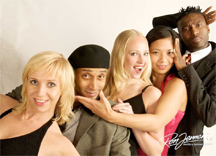If someone had casually approached Andy Ninvalle while he was still a teenager who loved break-dancing in the eighties and told him he had a future in dance, he would have patted that person on the back and countered with a simple, “I know”.

It is not a boast he identifies with, but a rather a self-assured attitude from a gut instinct that he was born to perform.
The eighties he so vividly remembers and recalls with pride were “good days”. He had a reputation then as one of the country’s best young hip-hop dancers, but he rarely takes credit for his moves back in those days. “I got those moves from Glen Hanoman. Yes, the big attorney,” Andy says, reminiscing on his youth during a recent interview with Stabroek News.
The question of how he turned out coming from a strong break-dancing background is one Andy has confronted a few times and that is only because he has done much more work in Europe than North America where a little commercial success could mean headline news back home. But in the years since he migrated to The Netherlands, Andy has been prolific.
Andy left Guyana around 1994 to pursue a career in the arts and he got a lucky break within months. He auditioned for an American choreographer and got the nod for a spot in a dance group. He needed work and it felt right at the time, but it was a few months later that he would meet Joycelyn Bergland. His earlier work in the Netherlands was more contemporary dance and jazz routines, it was only when Bergland saw him break-dancing that people started to sit up and take notice.

The youthful frame that Andy had back in the early 90s has matured into another; one which he admits is not as supple and also not in a position to take too many risks, but is still strong.
He recalls that his unrehearsed break-dancing steps gave him the exposure he was looking for to break into a performance career in a country that was strange to him, yet intriguing. It was while building a name as a serious dancer in the country that Andy made a decision to join a controversial show which translates in English to “Black Phobia”. It was a theatre presentation which he describes as exemplifying stereotypes of the black and white community. “It was really extreme,” he says and called it provocative and raw. The show was so raw, Andy recalls, that they would start out with around 500 people and wrap up the show with about 300 because the other section of the crowd was offended to the point where they got up and left.
“It was the sort of show that provoked people. At one time we performed in England and there was a lynch mob waiting for us outside, but that just proved to me that I was part of something that was stirring people up. We were using the art to confront issues,” he adds. Andy went on to perform in two other theatre productions, but eventually he returned to music.
In the years that followed he formed a group called ‘Mad Flava’ and performed for some time. The group was also signed to Interscope Records and the contract lasted close to a year. Andy says he was unable to commit to the contract because of the obligations he believed were conflicting with his nature to work on various projects.
He turned back to dance, naturally, and spent his time moving around the Netherlands and later Europe doing various dance styles, he performed hip-hop, jazz and techno but fused all his work with a Caribbean/Guyanese style.
“It was a fusion that merged the style with a bacchanal style,” he says.
Andy was accepted as an artiste in his adopted home and he expanded his work to school-based programmes. He is working to have dance included on the school curriculum in The Netherlands. The artist/dancer/performer who is known in family circles as Andy, but was actually born Elmer Roger Ninvalle, still has bigger dreams.
He has also worked on a movie soundtrack for a Polish film which when translated means Love and Dance. Andy recalls having a conversation with the movie producers who had asked him to do one song for the soundtrack, but later made a request for him to do the entire album. He has also collaborated with Dutch singers, Hans and Candy Dulfer.
Currently, he manages a dance company in The Netherlands called ‘Massive Movements’. He says the school accepts talent from across the world and he has French, Dutch, Spanish and Japanese students.
Since he was 12 years old Andy was dancing and part of a group called the ‘Whizz Kids’. Coming from a family where the arts seemed to have taken root, he embraced dancing and later learned that he also has good vocals. Andy was the ‘Smooth’ half of a local group called ‘Smooth and Easy’ which later split when ‘Easy’ migrated. His childhood days count among the greatest memories he has.
He recalls growing up with four older brothers, all of whom were creative in some way; saying he was influenced by his family. Andy has identified with his Guyanese heritage his whole life, but his work remains largely unknown to locals. “I would love to come home and have my work exhibited, but that would be based on the feedback I get during discussions with people in a position to advise me,” he says.
Should Andy decide to come home and give a taste of what he has been offering Europe all these years, Guyanese would do well to show him the respect he deserves by showing up to see his work.





